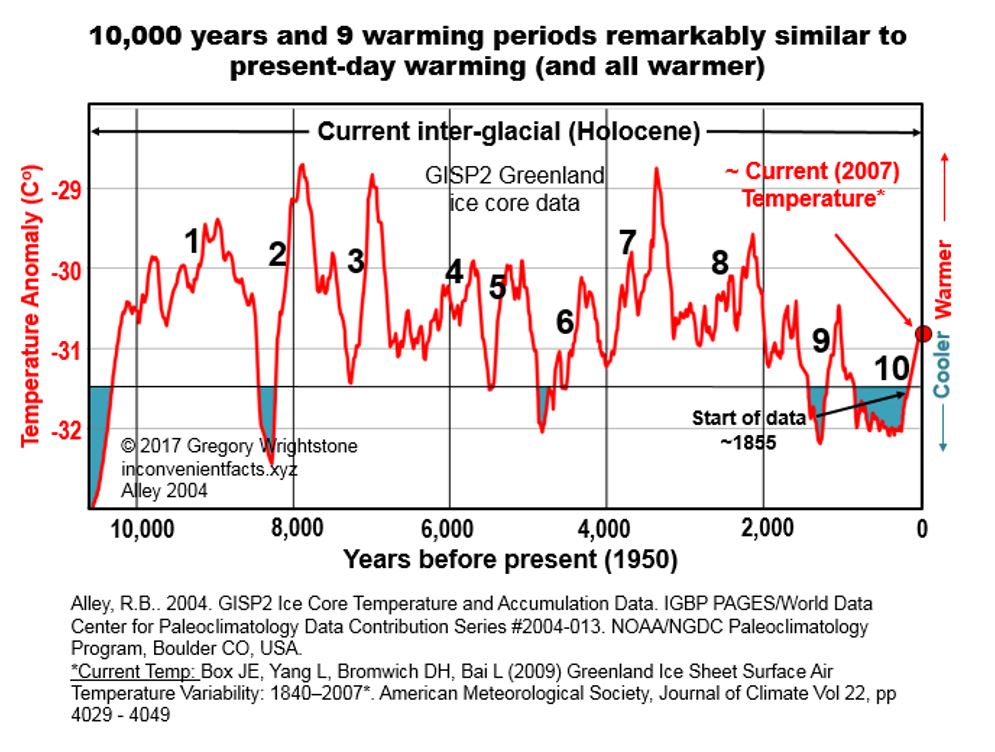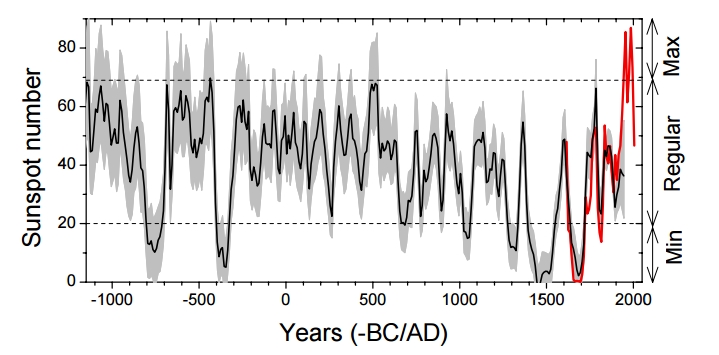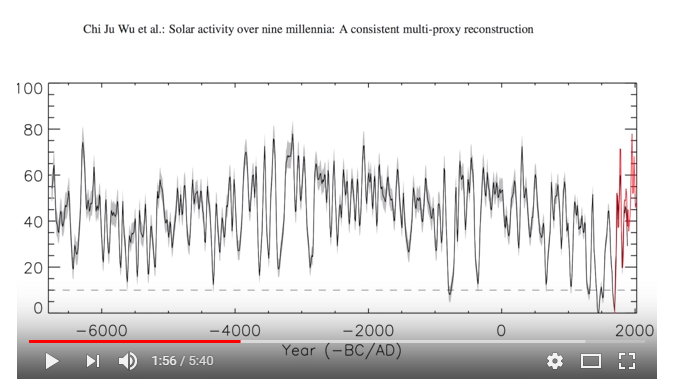|
|
Post by gridley on Feb 16, 2023 12:18:03 GMT
What passes for news worthy BS in this country as a replacement for actual investigative reporting and probing inquiry is stupefying. They know their audience. My personal favorite.  American science at it's best.
European colonization of the Americas resulted in the killing of so many native people that it transformed the environment and caused the Earth’s climate to cool down, new research has found.
Settlers killed off huge numbers of people in conflicts and also by spreading disease, which reduced the indigenous population by 90% in the century following Christopher Columbus’s initial journey to the Americas and Caribbean in 1492.
This “large-scale depopulation” resulted in vast tracts of agricultural land being left untended, researchers say, allowing the land to become overgrown with trees and other new vegetation.
The regrowth soaked up enough carbon dioxide from the atmosphere to actually cool the planet, with the average temperature dropping by 0.15C in the late 1500s and early 1600s, the study by scientists at University College London found.
“The great dying of the indigenous peoples of the Americas resulted in a human-driven global impact on the Earth system in the two centuries prior to the Industrial Revolution,” wrote the UCL team of Alexander Koch, Chris Brierley, Mark Maslin and Simon Lewis.
The drop in temperature during this period is known as the “Little Ice Age”, a time when the River Thames in London would regularly freeze over, snowstorms were common in Portugal and disrupted agriculture caused famines in several European countries.
"Vast tracts of agricultural land"... where, exactly? The Plains tribes didn't farm to any notable extent, most of the NE tribes didn't either, from what I've seen the NW tribes didn't at all... are we re-inventing history again? |
|
|
|
Post by ratty on Feb 16, 2023 23:06:02 GMT
My personal favorite.  American science at it's best. European colonization of the Americas resulted in the killing of so many native people that it transformed the environment and caused the Earth’s climate to cool down, new research has found.
Settlers killed off huge numbers of people in conflicts and also by spreading disease, which reduced the indigenous population by 90% in the century following Christopher Columbus’s initial journey to the Americas and Caribbean in 1492.
This “large-scale depopulation” resulted in vast tracts of agricultural land being left untended, researchers say, allowing the land to become overgrown with trees and other new vegetation.
The regrowth soaked up enough carbon dioxide from the atmosphere to actually cool the planet, with the average temperature dropping by 0.15C in the late 1500s and early 1600s, the study by scientists at University College London found.
“The great dying of the indigenous peoples of the Americas resulted in a human-driven global impact on the Earth system in the two centuries prior to the Industrial Revolution,” wrote the UCL team of Alexander Koch, Chris Brierley, Mark Maslin and Simon Lewis.
The drop in temperature during this period is known as the “Little Ice Age”, a time when the River Thames in London would regularly freeze over, snowstorms were common in Portugal and disrupted agriculture caused famines in several European countries.
"Vast tracts of agricultural land"... where, exactly? The Plains tribes didn't farm to any notable extent, most of the NE tribes didn't either, from what I've seen the NW tribes didn't at all... are we re-inventing history again? It's been done here too. A book called 'Dark Emu' was (still is?) widely applauded by our national broadcaster (ABC); it made out that aborigines were constructors and cultivators. It was all nonsense, it's been debunked but the myths it generated live on ....
|
|
|
|
Post by missouriboy on Feb 22, 2023 1:23:03 GMT
Climate Data Series & Climate Cycles (Part 1: a continuing endeavor)
Much of my undergraduate studies were in geology. One of the operational theses of the time was Uniformitarianism. "The present is the key to the past". Of course geologists were referring to processes. Thus, the fluvial processes of today would have operated similarly a million years ago, etc. Things do change though. Continents didn't move till about 60+ years ago.  The longest, continuous temperature time series that I have was constructed by Alley from oxygen isotopes preserved in the Greenland ice cap and published in 2004. The following are two graphs based on his data. And links to an article that discusses his results and a more recent one. Both show embedded cycles. The Roman and Medieval Warm Periods stand out, but are dwarfed by previous periods that were 1 to 1.5C warmer. We "assume" (for now) that at least some of the processes which "created" these differing climate conditions were similar. Climate has been recently defined as averages constructed over 30 years. It could logically be longer, but our observed (and recorded) data are relatively short.
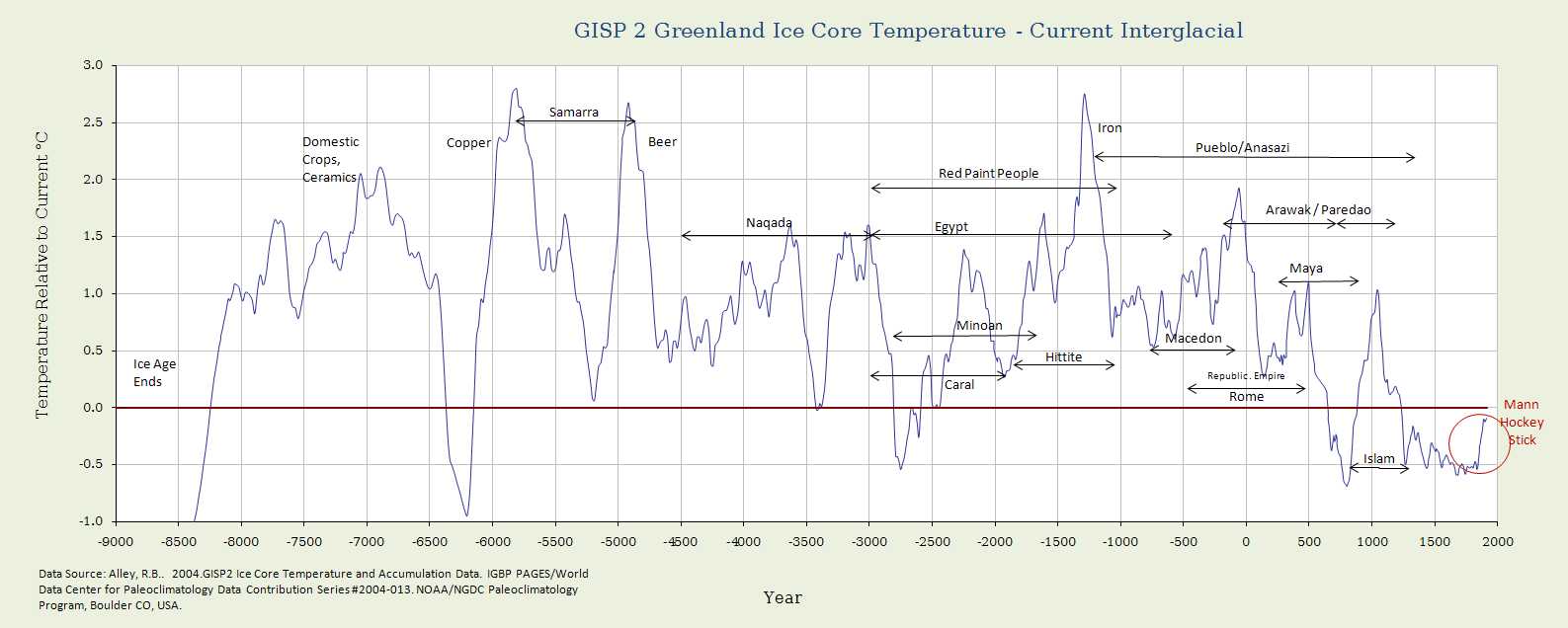 Usoskin et al., 2014
“[T]he modern Grand maximum (which occurred during solar cycles 19–23, i.e., 1950–2009) was a rare or even unique event, in both magnitude and duration, in the past three millennia. Except for these extreme cases, our reconstruction otherwise reveals that solar activity is well confined within a relatively narrow range.”
Sunspots and Geomagnetic Activity Sunspots have been recorded for several hundred years and reconstructions go back nearly as far as the GISP2 data. Wu suggests that sunspots during our most recent grand solar maximum were the highest in 5000 years. As implied by the name, a solar cycle is a "cycle" ... and they do repeat on a regular basis at various intensities. Geomagnetic activity has been recorded since 1845, and generally peak as northern and southern hemisphere sunspot bands converge toward the equator. You can see this in the chart after Wu. Seems clear that geomagnetic activity runs with solar cycles ... and is the lowest it has been since the Centennial Minimum of the late 1800s.
|
|
|
|
Post by missouriboy on Feb 22, 2023 4:36:26 GMT
There are several testable hypotheses in this Zharkova paper. By the end of cycle 27, not many of us will be left. Might I suggest a mid-cycle SC26 update get-together? If Michael Mann can't come, who'll bring the roast pig and crow?
|
|
|
|
Post by blustnmtn on Feb 28, 2023 13:37:12 GMT
|
|
|
|
Post by missouriboy on Feb 28, 2023 23:25:44 GMT
Geothermal heating in the Indonesian Arc to some extent? Old non-popular argument ... but with an internal gradient of 4+C.  |
|
|
|
Post by missouriboy on Mar 1, 2023 18:32:19 GMT
Not identifying all the components of this. Note that the IR heading to Space has been trending upward since the end of SC23. Might that have a cooling component? Everyone gets excited that extra CO2 in the atmosphere blocks/slows the release of heat to space. Well? 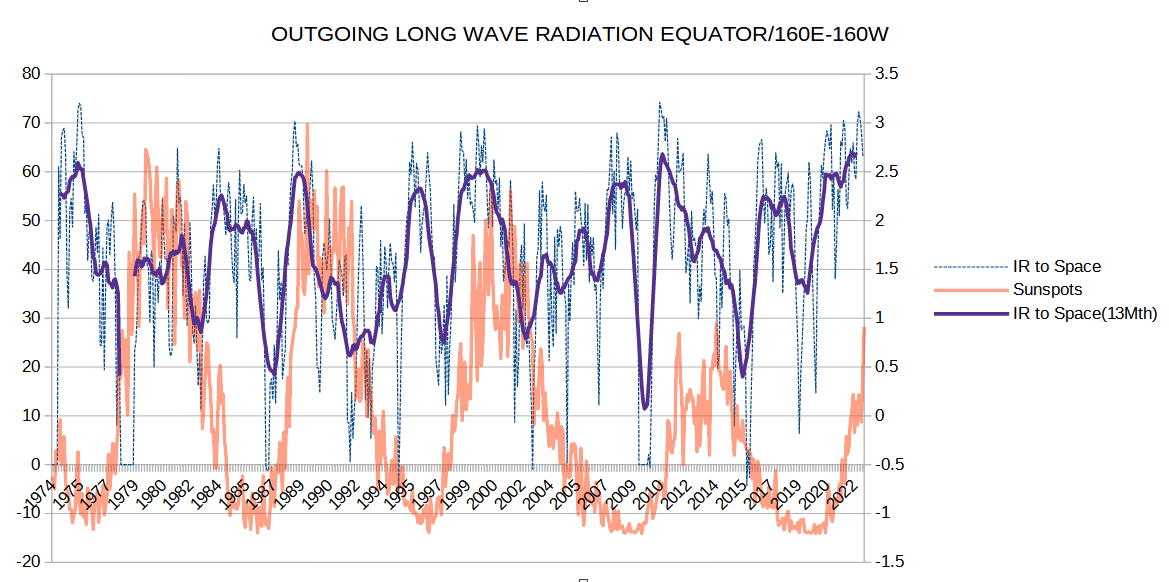 |
|
|
|
Post by missouriboy on Mar 1, 2023 20:09:16 GMT
It's good to see that the UN is on top of it's game. If y'all had employees like that, what would you do with them? I assume that they don't talk to Dr Roy much!
An exceptionally long La Nina weather phenomenon that intensified drought and flooding is finally ending, the United Nations said Wednesday -- but what comes next might bring its own problems.
The outgoing La Nina phenomenon, a cooling of surface temperatures that can have a widespread impact on global weather conditions, started in September 2020.
However, despite La Nina's cooling effect, both 2021 and 2022 were warmer than any year prior to 2015.
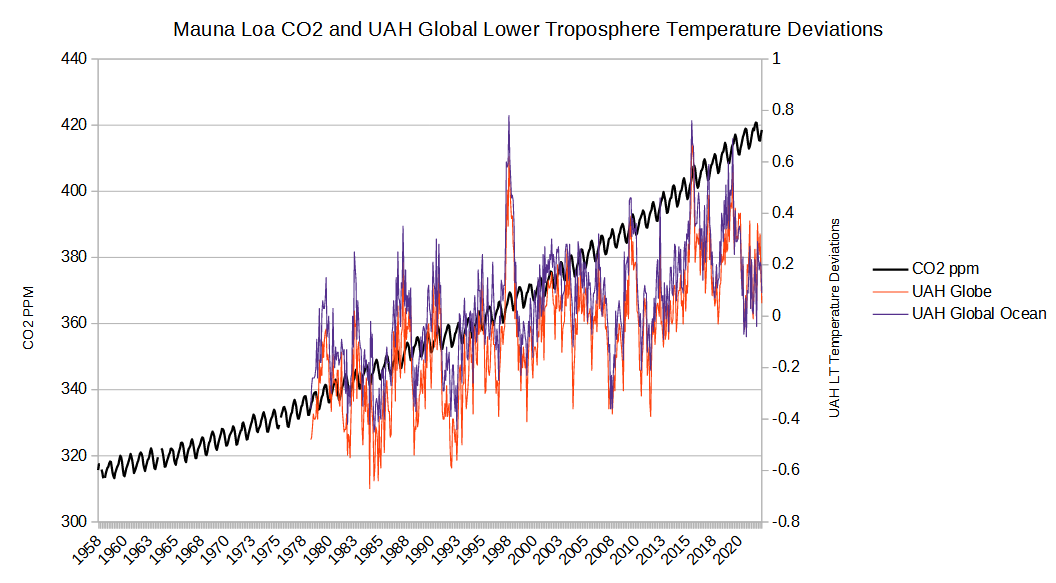 |
|
|
|
Post by missouriboy on Mar 5, 2023 4:31:31 GMT
Putting "Climate" in front of Scientist is akin to putting "Witch" in front of Doctor. 
(from the comments.)
41% of Climate Scientists Don’t Believe in Catastrophic Climate Change, Major New Poll Find
|
|
|
|
Post by missouriboy on Mar 9, 2023 15:56:28 GMT
"It Is Important To Know What You Don't Know"
This should be required "watching" in natural science courses. |
|
|
|
Post by missouriboy on Mar 16, 2023 20:54:21 GMT
Hope he's wrong. Otherwise, turn up the CO2.
|
|
|
|
Post by walnut on Mar 20, 2023 13:10:20 GMT
|
|
|
|
Post by Sigurdur on Mar 20, 2023 14:09:13 GMT
I am panicked.
Ok, not really.
Ok, so much not really we took a drive yesterday with no destination in mind. The ice cream cone went down nicely, the observed cattle and goats seemed to not have a care in the world.
The observed humans seemed to be in good humor.
|
|
|
|
Post by ratty on Mar 20, 2023 22:45:12 GMT
I am panicked. Ok, not really. Ok, so much not really we took a drive yesterday with no destination in mind. The ice cream cone went down nicely, the observed cattle and goats seemed to not have a care in the world. The observed humans seemed to be in good humor. Much the same here, minus the cattle and goats ....  |
|
|
|
Post by code on Mar 20, 2023 23:36:28 GMT
Yeah, I've been smelling the news stories today. I liked this one as a breath of fresh air.
Feasibility for achieving a net zero economy for the U.S. by 2050
Posted on March 4, 2023
By Michael J. Kelly
(Michael Joseph Kelly FRS and FREng (born 14 May 1949) is a New Zealand-British physicist. He was Prince Philip Professor of Technology in the Department of Engineering of the University of Cambridge from 2002 to 2016.)
|
|
 American science at it's best.
American science at it's best. American science at it's best.
American science at it's best.
 book by Bruce Pascoe. It reexamines colonial accounts of Aboriginal people in Australia, and cites evidence of pre-colonial agriculture, engineering and building construction by Aboriginal and Torres Strait Islander peoples.
book by Bruce Pascoe. It reexamines colonial accounts of Aboriginal people in Australia, and cites evidence of pre-colonial agriculture, engineering and building construction by Aboriginal and Torres Strait Islander peoples.


